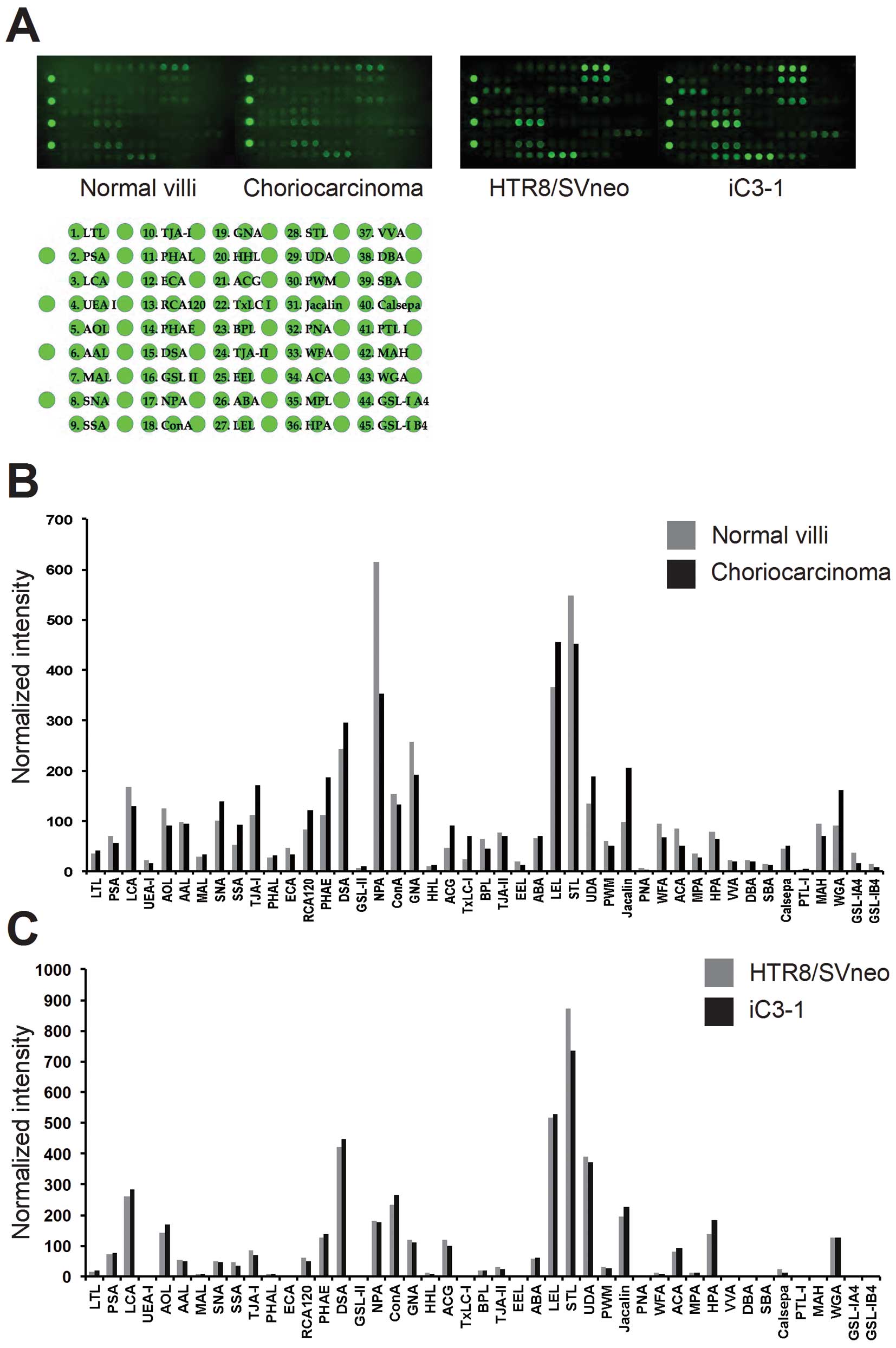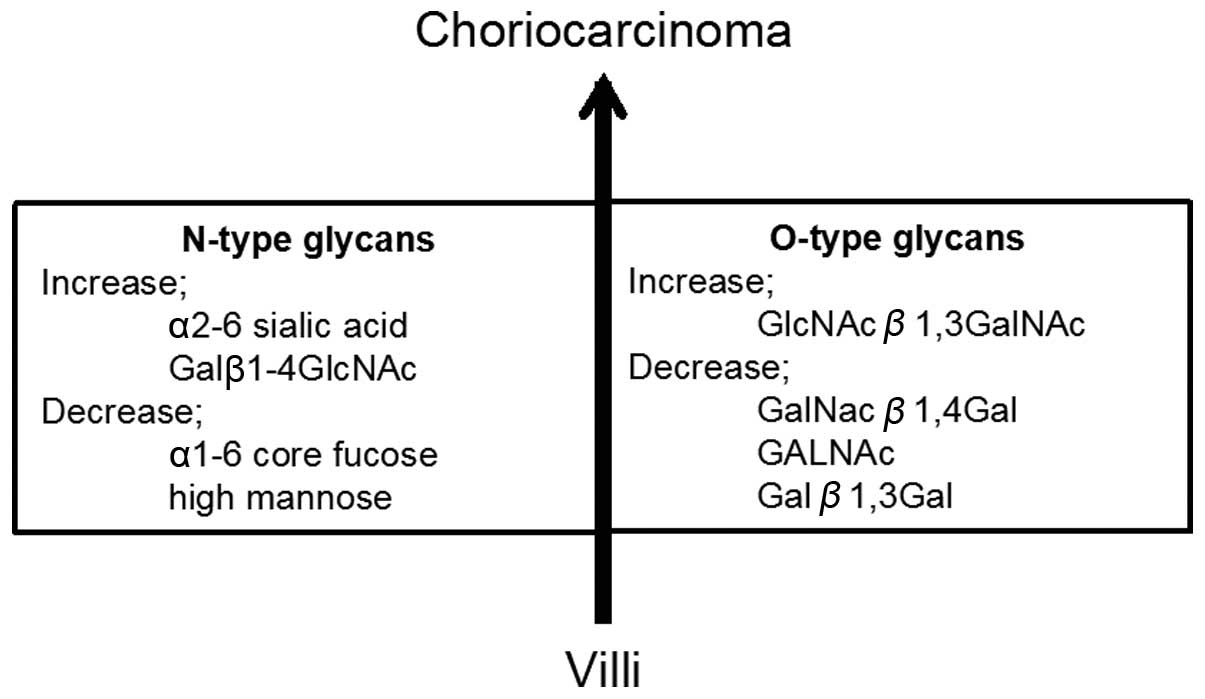|
1
|
Shih IeM: Gestational trophoblastic
neoplasia - pathogenesis and potential therapeutic targets. Lancet
Oncol. 8:642–650. 2007. View Article : Google Scholar : PubMed/NCBI
|
|
2
|
Cavaliere A, Ermito S, Dinatale A and
Pedata R: Management of molar pregnancy. J Prenat Med. 3:15–17.
2009.
|
|
3
|
Cole LA: hCG, the wonder of today’s
science. Reprod Biol Endocrinol. 10:242012.PubMed/NCBI
|
|
4
|
Morelle W, Canis K, Chirat F, Faid V and
Michalski JC: The use of mass spectrometry for the proteomic
analysis of glycosylation. Proteomics. 6:3993–4015. 2006.
View Article : Google Scholar : PubMed/NCBI
|
|
5
|
Ohtsubo K and Marth JD: Glycosylation in
cellular mechanisms of health and disease. Cell. 126:855–867. 2006.
View Article : Google Scholar : PubMed/NCBI
|
|
6
|
Goetz JA, Mechref Y, Kang P, Jeng MH and
Novotny MV: Glycomic profiling of invasive and non-invasive breast
cancer cells. Glycoconj J. 26:117–131. 2009. View Article : Google Scholar : PubMed/NCBI
|
|
7
|
Satomaa T, Heiskanen A, Leonardsson I, et
al: Analysis of the human cancer glycome identifies a novel group
of tumor-associated N-acetylglucosamine glycan antigens. Cancer
Res. 69:5811–5819. 2009. View Article : Google Scholar : PubMed/NCBI
|
|
8
|
Patwa T, Li C, Simeone DM and Lubman DM:
Glycoprotein analysis using protein microarrays and mass
spectrometry. Mass Spectrom Rev. 29:830–844. 2010. View Article : Google Scholar : PubMed/NCBI
|
|
9
|
Fry SA, Afrough B, Lomax-Browne HJ, Timms
JF, Velentzis LS and Leathem AJ: Lectin microarray profiling of
metastatic breast cancers. Glycobiology. 21:1060–1070. 2011.
View Article : Google Scholar : PubMed/NCBI
|
|
10
|
Kobayashi Y, Shimizu T, Naoe H, et al:
Establishment of a choriocarcinoma model from immortalized normal
extravillous trophoblast cells transduced with HRASV12. Am J
Pathol. 179:1471–1482. 2011. View Article : Google Scholar : PubMed/NCBI
|
|
11
|
Kobayashi Y, Banno K, Shimizu T, et al:
Gene expression profile of a newly established choriocarcinoma cell
line, iC3-1, compared to existing choriocarcinoma cell
lines and normal placenta. Placenta. 34:110–118. 2013. View Article : Google Scholar : PubMed/NCBI
|
|
12
|
Graham CH, Hawley TS, Hawley RG, et al:
Establishment and characterization of first trimester human
trophoblast cells with extended lifespan. Exp Cell Res.
206:204–211. 1993. View Article : Google Scholar : PubMed/NCBI
|
|
13
|
Kuno A, Uchiyama N, Koseki-Kuno S, et al:
Evanescent-field fluorescence-assisted lectin microarray: a new
strategy for glycan profiling. Nat Methods. 2:851–856. 2005.
View Article : Google Scholar : PubMed/NCBI
|
|
14
|
Matsuda A, Kuno A, Ishida H, Kawamoto T,
Shoda J and Hirabayashi J: Development of an all-in-one technology
for glycan profiling targeting formalin-embedded tissue sections.
Biochem Biophys Res Commun. 370:259–263. 2008. View Article : Google Scholar : PubMed/NCBI
|
|
15
|
Muthana SM, Campbell CT and Gildersleeve
JC: Modifications of glycans: biological significance and
therapeutic opportunities. ACS Chem Biol. 7:31–43. 2012. View Article : Google Scholar : PubMed/NCBI
|
|
16
|
Sacchettini JC, Baum LG and Brewer CF:
Multivalent protein-carbohydrate interactions. A new paradigm for
supermolecular assembly and signal transduction. Biochemistry.
40:3009–3015. 2001. View Article : Google Scholar : PubMed/NCBI
|
|
17
|
Stanley P: Biological consequences of
overexpressing or eliminating N-acetylglucosaminyltransferase-TIII
in the mouse. Biochim Biophys Acta. 1573:363–368. 2002. View Article : Google Scholar : PubMed/NCBI
|
|
18
|
Zhao J, Patwa TH, Lubman DM and Simeone
DM: Protein biomarkers in cancer: natural glycoprotein microarray
approaches. Curr Opin Mol Ther. 10:602–610. 2008.PubMed/NCBI
|
|
19
|
Hirabayashi J, Yamada M, Kuno A and Tateno
H: Lectin microarrays: concept, principle and applications. Chem
Soc Rev. 42:4443–4458. 2013. View Article : Google Scholar : PubMed/NCBI
|
|
20
|
Teng BP, Heffler MD, Lai EC, et al:
Inhibition of hyaluronan synthase-3 decreases subcutaneous colon
cancer growth by increasing apoptosis. Anticancer Agents Med Chem.
11:620–628. 2011. View Article : Google Scholar : PubMed/NCBI
|
|
21
|
Twarock S, Freudenberger T, Poscher E, et
al: Inhibition of oesophageal squamous cell carcinoma progression
by in vivo targeting of hyaluronan synthesis. Mol Cancer.
10:302011. View Article : Google Scholar : PubMed/NCBI
|
|
22
|
Song K, Li Q, Peng YB, et al: Silencing of
hHS6ST2 inhibits progression of pancreatic cancer through
inhibition of Notch signalling. Biochem J. 436:271–282. 2011.
View Article : Google Scholar : PubMed/NCBI
|
|
23
|
Waaijer CJ, de Andrea CE, Hamilton A, van
Oosterwijk JG, Stringer SE and Bovée JV: Cartilage tumour
progression is characterized by an increased expression of heparan
sulphate 6O-sulphation-modifying enzymes. Virchows Arch.
461:475–481. 2012. View Article : Google Scholar : PubMed/NCBI
|
|
24
|
Ferreras C, Rushton G, Cole CL, et al:
Endothelial heparan sulfate 6-O-sulfation levels regulate
angiogenic responses of endothelial cells to fibroblast growth
factor 2 and vascular endothelial growth factor. J Biol Chem.
287:36132–36146. 2012.PubMed/NCBI
|
|
25
|
Chen CY, Jan YH, Juan YH, et al:
Fucosyltransferase 8 as a functional regulator of nonsmall cell
lung cancer. Proc Natl Acad Sci USA. 110:630–635. 2013. View Article : Google Scholar : PubMed/NCBI
|
|
26
|
Kroes RA, Dawson G and Moskal JR: Focused
microarray analysis of glyco-gene expression in human
glioblastomas. J Neurochem. 103(Suppl 1): S14–S24. 2007. View Article : Google Scholar : PubMed/NCBI
|
|
27
|
Loo LW, Tiirikainen M, Cheng I, et al:
Integrated analysis of genome-wide copy number alterations and gene
expression in microsatellite stable, CpG island methylator
phenotype-negative colon cancer. Genes Chromosomes Cancer.
52:450–466. 2013. View Article : Google Scholar
|
|
28
|
Soria JC, Márk Z, Zatloukal P, et al:
Randomized phase II study of dulanermin in combination with
paclitaxel, carboplatin, and bevacizumab in advanced non-small-cell
lung cancer. J Clin Oncol. 29:4442–4451. 2011. View Article : Google Scholar : PubMed/NCBI
|
|
29
|
Lange T, Ullrich S, Müller I, et al: Human
prostate cancer in a clinically relevant xenograft mouse model:
identification of β(1,6)-branched oligosaccharides as a marker of
tumor progression. Clin Cancer Res. 18:1364–1373. 2012.PubMed/NCBI
|
|
30
|
Chen X, Yang TT, Qiu XC, et al: Gene
expression profiles of human osteosarcoma cell sublines with
different pulmonary metastatic potentials. Cancer Biol Ther.
11:287–292. 2011. View Article : Google Scholar : PubMed/NCBI
|
|
31
|
Nakano T, Shimizu K, Kawashima O, et al:
Establishment of a human lung cancer cell line with high metastatic
potential to multiple organs: Gene expression associated with
metastatic potential in human lung cancer. Oncol Rep. 28:1727–1735.
2012.PubMed/NCBI
|
|
32
|
Nishijima Y, Toyoda M, Yamazaki-Inoue M,
et al: Glycan profiling of endometrial cancers using lectin
microarray. Genes Cells. 17:826–836. 2012. View Article : Google Scholar : PubMed/NCBI
|
|
33
|
Moriwaki K, Okudo K, Haraguchi N, et al:
Combination use of anti-CD133 antibody and SSA lectin can
effectively enrich cells with high tumorigenicity. Cancer Sci.
102:1164–1170. 2011. View Article : Google Scholar : PubMed/NCBI
|
















